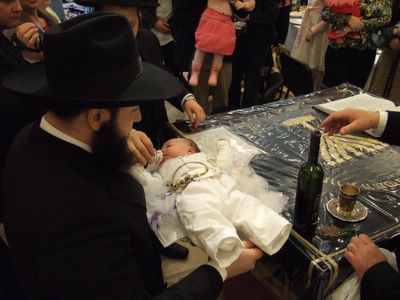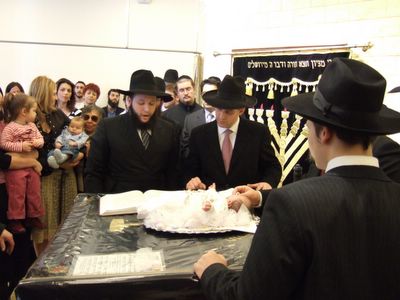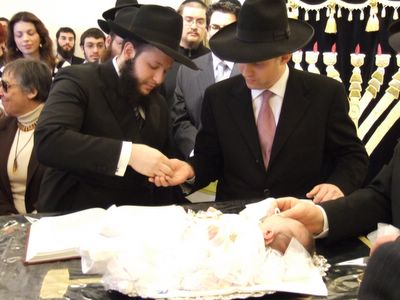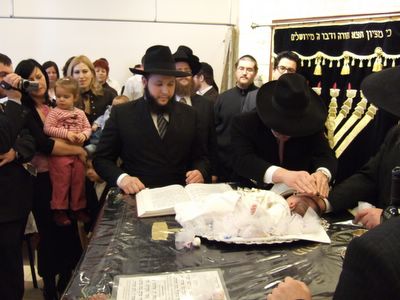Pidyon Haben
Yesterday was the Pidyon Haben of Yosef Yitzchok Stambler,the 1st born son of Rabbi Sholom Ber Stambler Shliacah of Chabad Of Warsaw.
while we are at it here is the article i found and printed out for the Pidyon Haben.
Pidyon Haben, redemption of the first-born son, is a beautiful and meaningful ritual, yet far too few in our community have had the pleasure of attending such a ceremony. Pidyon Haben is less known than Brit Milah (ritual circumcision) for one obvious reason. While every Jewish boy requires Brit Milah, many sons are exempt from Pidyon Haben. Nonetheless, even with its less common occurrence, the ceremony of Pidyon Haben teaches us a lot about the values by which we should raise our children. A little background, The Torah calls upon all of us to offer the first of everything as a gift to God, as a sign of our gratitude. So, first fruits, first crops, first animal, and even first children are included. The Torah specifically instructs that a woman's first-born male is required to serve in the central place of worship. However, the Torah then presents a change in plans: the Levites are chosen to replace the first-born male Israelites as the workers in the Tabernacle, and later, the Temple in Jerusalem. To legitimately excuse the Israelite first-born male from direct service to God, the child's father is required to buy his son from the Kohen for the redemption price of five shekels, with five silver dollars serving as an appropriate substitution in modern times. The Pidyon Haben ceremony is essentially a conversation, albeit in Aramaic, between the father of the child and a Kohen (a male descendent of Aaron, Moses brother, and the family that served as priests in the days of the Tabernacle and Temple). The kohen asks the father if he wishes to keep his money, or alternatively, to pay the five coins in order to redeem the first-born son from future Temple service. Though the father is presented with a choice, there really is no choice. The father is required by Jewish law to pay the money and successfully conclude the act of redemption. The ceremony of Pidyon Haben is ideally performed on the child's 31st day of life. It can be held later if absolutely necessary. An adult male who discovers he was never redeemed by a parent is permitted, and required, by Jewish law to redeem himself. To be subject to redemption, the child must be male, the first born of his mother. The son must have been born via the birth canal, and not by caesarean section. If a mother had a previous pregnancy resulting in a miscarriage any later than day 40, then a subsequent child would not be considered a true first born. A son whose father or mother is the child of a male Kohen or Levite is not subject to redemption. Even with so many limitations, there are still opportunities in the community to view this traditional rite of passage. And there are important value lessons embedded in the ceremony of Pidyon Haben that are instructive to us all -- sons and daughters and the parents and guardians of our children. Pidyon Haben teaches us to connect our lives with history, to never forget the glory of the Temple and the leadership of the kohen. Pidyon Haben reminds us to be ever grateful, recalling the sparing of the first born in Egypt, and also affirming that every child is a gift from God. This ceremony helps us understand that a parent's job is not to own a child, but rather to be God's representative in teaching the child the proper way to live. When the Kohen asks the father, which do you prefer, to keep your child or keep your money? The answer is both obvious, but also instructive. Of course, a parent must be ready and willing to part with money in order to provide a home for the child. And the money must be spent wisely. How appropriate that, in most cases, the Kohen will offer the five coins as a down payment on the child's Jewish education. Pidyon Haben is a great lesson for our entire community in demonstrating the best of Jewish values.
Photos taken by Mordechai Lightstone and are courtesy of Letters of Thought.
























Father and 1st Born son




The Transaction


Birchas Kohanim (Preistly Blessing)


Blessing over the cup of wine












Avi Bessler


Reb Duvid Tenenbaum speaking




The Kohen Speaking


Singing


Shmuli Hecht Speaking




Yakov Finkelstein from the Israeli embassy speaking


Johnny Walker Blue Label





0 Comments:
Post a Comment
<< Home